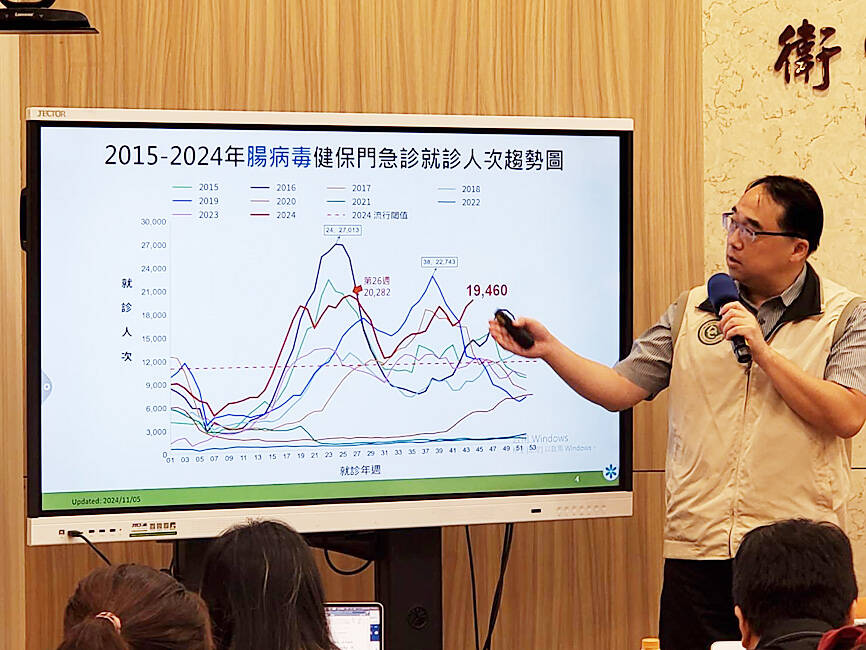The Centers for Disease Control (CDC) yesterday said that more than 19,000 cases of enterovirus infections were recorded from Oct. 27 to Saturday last week, the highest number for the period in the past 10 years.
Over those seven days, 19,460 people visited emergency departments or outpatient clinics due to enterovirus infections — a 4.7 percent week-on-week increase, CDC spokeswoman Tseng Shu-hui (曾淑慧) told a news conference.
“Enterovirus is highly contagious and is most easily spread in places with close contact and frequent interactions between people such as homes, kindergartens, daycare classes and childcare centers,” the CDC said in a statement.

Photo: Lin Hui-chin, Taipei Times
This year’s unusually severe autumn-winter outbreak might be because many children were not exposed to a wide variety of virus strains during the COVID-19 pandemic, Tseng said.
The CDC spokeswoman said that 265 classes — 25 elementary-school classes, 186 kindergarten classes and 54 others — were suspended in the seven-day period.
The epidemic is expected to peak late this month, but cases would probably remain high through next month, she said.
“The usual seasonal pattern for enterovirus is that outbreaks occur from late March to early April, with the peak in late May to early June,” she said. “After the summer vacation, cases typically decrease, but tend to rise again in September with the start of the school year.”
“However, this year the epidemic persisted through the summer and surged in the autumn and winter, which is unusual,” she said.
The center urged parents to “implement good hygiene” such as washing hands with soap and water, and regularly disinfect home and learning environments.
The CDC said children under the age of five are at “high risk” of severe enterovirus infection, symptoms of which include drowsiness, low energy, weakness or paralysis of hands and feet, muscle twitching or contractions, persistent vomiting and shortness of breath.
“People should pay attention to the early warning signs of severe enterovirus in children” and take them to hospital as soon as possible if symptoms are detected, the CDC said.

HORROR STORIES: One victim recounted not realizing they had been stabbed and seeing people bleeding, while another recalled breaking down in tears after fleeing A man on Friday died after he tried to fight the knife-wielding suspect who went on a stabbing spree near two of Taipei’s busiest metro stations, Taipei Mayor Chiang Wan-an (蔣萬安) said. The 57-year-old man, identified by his family name, Yu (余), encountered the suspect at Exit M7 of Taipei Main Station and immediately tried to stop him, but was fatally wounded and later died, Chiang said, calling the incident “heartbreaking.” Yu’s family would receive at least NT$5 million (US$158,584) in compensation through the Taipei Rapid Transit Corp’s (TRTC) insurance coverage, he said after convening an emergency security response meeting yesterday morning. National

Taiwan has overtaken South Korea this year in per capita income for the first time in 23 years, IMF data showed. Per capita income is a nation’s GDP divided by the total population, used to compare average wealth levels across countries. Taiwan also beat Japan this year on per capita income, after surpassing it for the first time last year, US magazine Newsweek reported yesterday. Across Asia, Taiwan ranked fourth for per capita income at US$37,827 this year due to sustained economic growth, the report said. In the top three spots were Singapore, Macau and Hong Kong, it said. South

PLANNED: The suspect visited the crime scene before the killings, seeking information on how to access the roof, and had extensively researched a 2014 stabbing incident The suspect in a stabbing attack that killed three people and injured 11 in Taipei on Friday had planned the assault and set fires at other locations earlier in the day, law enforcement officials said yesterday. National Police Agency (NPA) Director-General Chang Jung-hsin (張榮興) said the suspect, a 27-year-old man named Chang Wen (張文), began the attacks at 3:40pm, first setting off smoke bombs on a road, damaging cars and motorbikes. Earlier, Chang Wen set fire to a rental room where he was staying on Gongyuan Road in Zhongzheng District (中正), Chang Jung-hsin said. The suspect later threw smoke grenades near two exits

The Forestry and Nature Conservation Agency yesterday launched a gift box to market honey “certified by a Formosan black bear” in appreciation of a beekeeper’s amicable interaction with a honey-thieving bear. Beekeeper Chih Ming-chen (池明鎮) in January inspected his bee farm in Hualien County’s Jhuosi Township (卓溪) and found that more than 20 beehives had been destroyed and many hives were eaten, with bear droppings and paw prints near the destroyed hives, the agency said. Chih returned to the farm to move the remaining beehives away that evening when he encountered a Formosan black bear only 20m away, the agency said. The bear